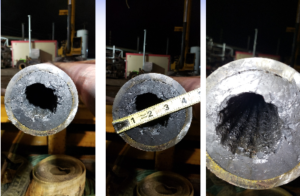Michael Kimbrell - Becht Engineering
-
 Many Delayed Coker Feed Heaters are coking or fouling at far more rapid rates than historical. While this trend can be attributed in part to a decline in feed quality, particularly for refiners processing opportunity crudes, there are many other factors which can influence the fouling rate. When combined, these factors can have an equal, or even larger, impact on the increased fouling rate of the Coker Feed Heaters.
Many Delayed Coker Feed Heaters are coking or fouling at far more rapid rates than historical. While this trend can be attributed in part to a decline in feed quality, particularly for refiners processing opportunity crudes, there are many other factors which can influence the fouling rate. When combined, these factors can have an equal, or even larger, impact on the increased fouling rate of the Coker Feed Heaters.
This paper will overview the process used by Becht Engineering to assist a USGC Refiner in identifying the root causes behind the recent rapid fouling of their Delayed Coker Unit feed heater. This unit had historically run 12 to 18 months between unit outages to clean the furnace tubes but has lately required outages to clean the furnace in periods as short as one month.
Becht Engineering conducted a cold-eyes review (CER) of the Delayed Coker unit feed heater and associated equipment. Not only did the CER identify root causes including crude compatibility issues, but also checked the design and expected performance parameters. The CER utilized a structured approach and specialized tools, such as modeling of the process and combustion sides of the heater, to assess factors including feed quality, feed impurities, furnace burner operation, heater decoking strategies, foulant analyses, and unit operating parameters. The design and operation were compared to current best practices to develop a comprehensive plan to mitigate the factors behind the increased fouling rates. This plan includes recommended operational modifications as well as design modifications. These modifications will be reviewed as part of the paper.
 Michael R. ‘Mike’ Kimbrell has over 40 years of industrial experience in petroleum refining and petrochemical manufacturing. He has operations management experience in Crude Oil Distillation, Vacuum Unit Operation, Delayed Cokers, Sulfur Recovery including Claus and Tail Gas Units, Hydroprocessing including vacuum gas oil, diesel, naphtha hydrotreaters and semi-regen catalytic reformers. His process design experience includes Crude and Vacuum Units, two Delayed Cokers, a combined cycle CoGeneration Plant and a Tail Gas Unit. He has served as the Delayed Coking Process SME for BP Worldwide since 2004.
Michael R. ‘Mike’ Kimbrell has over 40 years of industrial experience in petroleum refining and petrochemical manufacturing. He has operations management experience in Crude Oil Distillation, Vacuum Unit Operation, Delayed Cokers, Sulfur Recovery including Claus and Tail Gas Units, Hydroprocessing including vacuum gas oil, diesel, naphtha hydrotreaters and semi-regen catalytic reformers. His process design experience includes Crude and Vacuum Units, two Delayed Cokers, a combined cycle CoGeneration Plant and a Tail Gas Unit. He has served as the Delayed Coking Process SME for BP Worldwide since 2004.






